|
|
|
Sort Order |
|
|
|
Items / Page
|
|
|
|
|
|
|
| Srl | Item |
| 1 |
ID:
147653
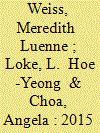

|
|
|
|
|
| Summary/Abstract |
The People’s Action Party’s unexpectedly strong win in Singapore’s September 2015 general election illuminates the dynamics of opposition under electoral authoritarianism. The conduct and outcome of the election raise questions not just of why the much-hyped opposition efforts fizzled, but also of the implications for Singapore politics, moving forward.
|
|
|
|
|
|
|
|
|
|
|
|
|
|
|
|
| 2 |
ID:
163069
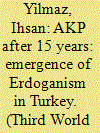

|
|
|
|
|
| Summary/Abstract |
In recent years, several observers of Turkey have recognised a novel development in Turkish politics: the rise of Erdoganism. President Recep Tayyip Erdoğan’s personality and style have come to embody the Turkish nation, the state and its economic, social and political institutions. But what is Erdoganism? What are its main attributes? Is it a mere ideology or the name of the emerging political regime in Turkey? While commentators have provided several observations of Erdoganism, it has not been duly examined on its own in the academic literature. This paper’s main premise is that in Turkey, a new political regime has emerged in recent years which can best be defined as Erdoganism. Erdoganism has four main dimensions: electoral authoritarianism as the electoral system, neopatrimonialism as the economic system, populism as the political strategy and Islamism as the political ideology. We first explain why we think Erdoganism is a better concept to define the emerging political regime in Turkey. We briefly discuss Sultanism, Khomeinism and Kemalism in order to produce a set of references for our discussion of Erdoganism. We then provide a thorough analysis, explaining the ways in which Erdoganism manifests itself through electoral authoritarianism, neopatrimonialism, populism and Islamism.
|
|
|
|
|
|
|
|
|
|
|
|
|
|
|
|
| 3 |
ID:
193627


|
|
|
|
|
| Summary/Abstract |
Malaysia’s 15th general election in November 2022 decisively ended the country’s dominant-party system. What might take its place, however, remains hazy—how competitive, how polarized, how politically liberal, and how stable an order might emerge will take some time to become clear. The opposition Pakatan Harapan (Alliance of Hope), having secured a plurality of seats, but with a sharply pronounced ethnic skew, formed a coalition government with the previously dominant, incumbent Barisan Nasional (National Front) and smaller, regional coalitions. This settlement resolved an immediate impasse, but relied upon obfuscation of real programmatic, ideological, and identity differences, raising questions of longer-term durability or results. Examining this uncertainty, we broach three broad queries, with resonance well beyond Malaysia. First, we examine the fragmentation and reconsolidation of Malaysian party politics to explore how party dominance transforms or collapses. Second, we explore the extent to which its dominant party defined or confirmed Malaysia as electoral-authoritarian, and whether we should still consider it so. Third, we ask what possibilities Malaysia’s apparent party-system deinstitutionalization opens up for structural reform beyond parties. Does the deterioration of that system—more than simply the previous dominant party’s electoral loss—clear the way for more far-reaching liberalization? All told, we find that Malaysia’s incremental dismantling of its dominant-party system does not also spell the end of electoral authoritarianism. Party and party-system deinstitutionalization leave the system in flux, but illiberal reconsolidation is as plausible as progressive structural reform.
|
|
|
|
|
|
|
|
|
|
|
|
|
|
|
|
| 4 |
ID:
119955
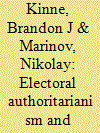

|
|
|
|
|
| Publication |
2013.
|
| Summary/Abstract |
How, if at all, do nondemocratic elections affect credible signaling in international crises? While the literature on credible signaling emphasizes the importance of electoral competition, it does not specify the minimal conditions that elections must satisfy in order to enhance the credibility of threats. We address this oversight by focusing on two fundamental properties of electoral institutions: (1) the degree of proincumbent bias and (2) the vulnerability of the incumbent to a de facto loss of power following an opposition victory. Our theory argues that both decreases in electoral bias and increases in incumbent vulnerability introduce greater accountability into the electoral process and thus enhance the credibility of public threats, even when elections fail to meet basic democratic standards. We apply these insights to the case of electoral authoritarianism, that is, regimes in which some form of electoral competition exists but basic principles of democratic governance are commonly violated. Using data on reciprocation rates in militarized crises, We show that, so long as electoral biases are sufficiently low and incumbent vulnerability is sufficiently high, even electoral authoritarian regimes are able to credibly signal resolve.
|
|
|
|
|
|
|
|
|
|
|
|
|
|
|
|
| 5 |
ID:
103583


|
|
|
|
|
| Publication |
2011.
|
| Summary/Abstract |
Studies of electoral authoritarianism in Southeast Asia highlight the significance of a compliant media in acting as an obstacle to democratization. Analyses of Malaysian politics are no different. Although the media in Malaysia is largely private, most observers point to the various legislative mechanisms and ownership structures through which compliance is ensured. Although most political scientists have concluded that such mechanisms ensure there is a progovernment bias, there have been few attempts to measure this bias and analyze its impact. With this study, the author aims to begin to fill that gap by studying the degree to which newspapers in Malaysia display partisanship in their coverage of Malaysian politics. To do so, two Malay-language newspapers were selected for coding, using two separate two-week periods as samples. The first period coincided with the March 2008 Malaysian general election, and the second, serving as a control, was from October 2006. Having demonstrated a clear degree of progovernment bias in both newspapers, the author then explores the factors postulated to explain this.
|
|
|
|
|
|
|
|
|
|
|
|
|
|
|
|
| 6 |
ID:
089924
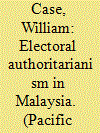

|
|
|
|
|
| Publication |
2009.
|
| Summary/Abstract |
This paper proposes an analytical framework by which to understand the origins, functioning, and dynamics of electoral authoritarianism in Malaysia. It thus explores notions of historical legacies, structural pressures, critical junctures, and institutional formation. But in guarding against teleology, it also considers elite agency and 'stunning elections'. This framework is applied in the case of Malaysia because, in anticipating contemporary trends, the country has so long perpetuated a paradigmatic electoral authoritarian regime. And yet, with many countries growing similarly authoritarian today, Malaysia has suddenly become less so, with the government having been dealt a startling setback in its latest contest, held in March 2008, thus losing its extraordinary majority in parliament and control over five states. Hence, if democratization once again gains steam round the world, Malaysia may presage this trend too, with its electoral authoritarianism, long so resilient, perhaps poised today on the edge of transition.
|
|
|
|
|
|
|
|
|
|
|
|
|
|
|
|
| 7 |
ID:
112513
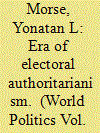

|
|
|
|
|
| Publication |
2012.
|
| Summary/Abstract |
In recent years scholarly attention has shifted from the study of democratization to the phenomenon of electoral authoritarianism. In these regimes, regular elections are held for national legislatures and chief executives, yet they fail to live up to democratic standards of freedom and fairness. A range of new research has investigated these regimes and especially the capacity of elections to either dislodge or reinvigorate authoritarian incumbents. This article reviews some of the current work on electoral authoritarianism and attempts to find ways to achieve synthesis and better theoretical development. It notes the need for greater conceptual consensus, attention to context, and better evaluation of what electoral competiveness means under authoritarian conditions. It argues that the next stage for research should be smaller and contextual comparison that can allow for greater attention to concepts, while allowing for strong midrange theory.
|
|
|
|
|
|
|
|
|
|
|
|
|
|
|
|
| 8 |
ID:
187733
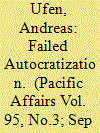

|
|
|
|
|
| Summary/Abstract |
Malaysian Prime Minister Najib Razak’s systematic strategy of autocratization backfired. This paper is based on a model of three pillars of authoritarian regimes. It traces the different strategies and measures employed to weaken the opposition and shows that major survival strategies were prone to frequent shifts. At the beginning of his tenure, Najib depicted himself as a reformer, and refined some forms of repression. The regime scrapped central coercive tools such as the Internal Security Act, but later replaced them with kindred, yet ineffective measures. Co-optation was more centralized and “money politics” expanded. The widespread and unprecedented usage of patronage resulted in corruption, which fundamentally destabilized the regime. Legitimation was modified since 2013 to a more Malay-centric and Islamist discourse. Because of this shift, legitimation eroded among ethnic and religious minorities. The prime minister’s legitimacy shrank due to corruption scandals. This paper helps gauge the lacking complementarity of the pillars and the failures of an authoritarian regime in crisis, which is important also with a view to political developments in Malaysia since 2018.
|
|
|
|
|
|
|
|
|
|
|
|
|
|
|
|
| 9 |
ID:
119084


|
|
|
|
|
| Publication |
2013.
|
| Summary/Abstract |
In 2011, after more than 20 years of direct rule, the Tatmadaw transferred formal authority to a nominally civilian government following Myanmar's first multi-party election since 1990 as part of a transformation of the political system to a presidential republic. Within this new arena, though, electoral manipulations and constitutional stipulations have brought to power a government consisting mostly of former military officers who are closely aligned to the Tatmadaw. These reforms, therefore, have changed the nature and organization of the ruling regime from that of a military one to an Electoral Authoritarian form. Elections now have become the main conduit to accessing power. Despite the maintenance of authoritarian rule (and the unclear motivations promoting such system change) the opening of the political realm and civil society creates avenues for new actors, identities, interests, and relationships to be constructed. A number of developments over the past few years are tentatively positive signs that Myanmar is undergoing a fundamental political change distinct from the years of military rule. In particular, the interactions of actors within and across civil-military, central-regional, and foreign relations will come to define the future trajectory of these reforms. Ultimately, the willingness of the Tatmadaw to abandon its praetorian ethos of directing the political process, specifically over security policy areas, will determine whether the system remains primarily in the service of regime maintenance or becomes an arena of increasingly diverse, free, and fair political discord with the possibility of power being assumed by those that are non-military.
|
|
|
|
|
|
|
|
|
|
|
|
|
|
|
|
| 10 |
ID:
143665
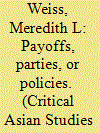

|
|
|
|
|
| Summary/Abstract |
A key part of what sustains electoral authoritarianism over the long term is genuine popular support. Dominant parties, particularly in a developmental context (the primary setting for such regimes), and especially where elections are more than minimally meaningful, curry performance legitimacy and loyalty not just through skewed rules and coercion, but through material incentives: “money politics.” If challengers can find a way to de-emphasize support based on material inducements, they stand a chance of securing gains via elections, rather than relying on economic downturns to shrink patronage coffers. Drawing on extensive original ethnographic and survey data from electoral-authoritarian Malaysia, I explore campaign finance and distributions on both sides in the latest, most regime-threatening general election, which was held on May 5, 2013. Evidence suggests that it was by disentangling clientelist networks from the patronage they so often serve to disseminate, allowing a focus on more programmatic than particularistic appeals, that the opposition Pakatan Rakyat alliance so nearly bested the long-dominant Barisan Nasional regime. Persona – being known and seen among the electorate – still matters as much as before, but relies less consistently than in the past on targeted patronage as a premise for loyalty.
|
|
|
|
|
|
|
|
|
|
|
|
|
|
|
|
| 11 |
ID:
105272
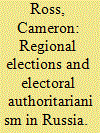

|
|
|
| 12 |
ID:
105271
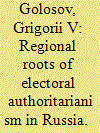

|
|
|
| 13 |
ID:
133769
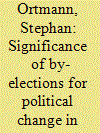

|
|
|
|
|
| Publication |
2014.
|
| Summary/Abstract |
By-elections in Singapore have played a different role depending on whether the country can be characterized as a hegemonic or competitive authoritarian regime. During the former, the ruling party was able to instrumentalize by-elections for leadership renewal and enhance its power. Conversely, they aided opposition parties as well, providing them a training ground.
|
|
|
|
|
|
|
|
|
|
|
|
|
|
|
|
| 14 |
ID:
133770
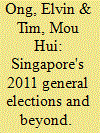

|
|
|
|
|
| Publication |
2014.
|
| Summary/Abstract |
We introduce the concept of a "credibility gap" to explain why the Workers' Party has been more successful than other opposition political parties in recent elections in Singapore. We argue that opposition parties need to overcome a credible commitment problem with the electorate in order to win against hegemonic parties.
|
|
|
|
|
|
|
|
|
|
|
|
|
|
|
|
| 15 |
ID:
142078


|
|
|
|
|
| Summary/Abstract |
We analyze and compare three separate efforts to code bias in Malaysia's media and find strong empirical evidence of an ongoing and profound progovernment bias in coverage. We also find, however, significant variation in bias between different types of news outlets. While Malay and Anglophone sources tended to be strongly progovernment, Chinese-language and online outlets were far more impartial. We demonstrate that both the general bias and the variation in it are largely the result of two factors: (1) government censorship and (2) ownership structures that link many major outlets to the ruling coalition. These findings provide a detailed view of the struggle for media independence in a less-than-democratic regime and supply insight into media bias across both authoritarian and democratic regimes in Asia, as well as outside it.
|
|
|
|
|
|
|
|
|
|
|
|
|
|
|
|
| 16 |
ID:
153718
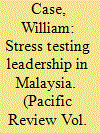

|
|
|
|
|
| Summary/Abstract |
Malaysia's strategic development fund, 1 Malaysia Development Corporation, has suffered enormous losses. Funds have been traced to the accounts of the prime minister, Najib Razak. Amid the scandal that has followed, Najib's leadership has been challenged. Analysis begins by identifying the institutions that have historically stabilized Malaysia's politics, including a single-dominant party, a fused party-state, an electoral authoritarian regime, a controlled legislature, and a powerful security apparatus. Next, it examines how these resilient institutions fell into the hands of Najib's rivals, converting them into ‘threatening vectors’. Finally, it shows how Najib, in exercising ruthless new leadership, regained control over institutions and turned back challenges.
|
|
|
|
|
|
|
|
|
|
|
|
|
|
|
|
|
|
|
|
|